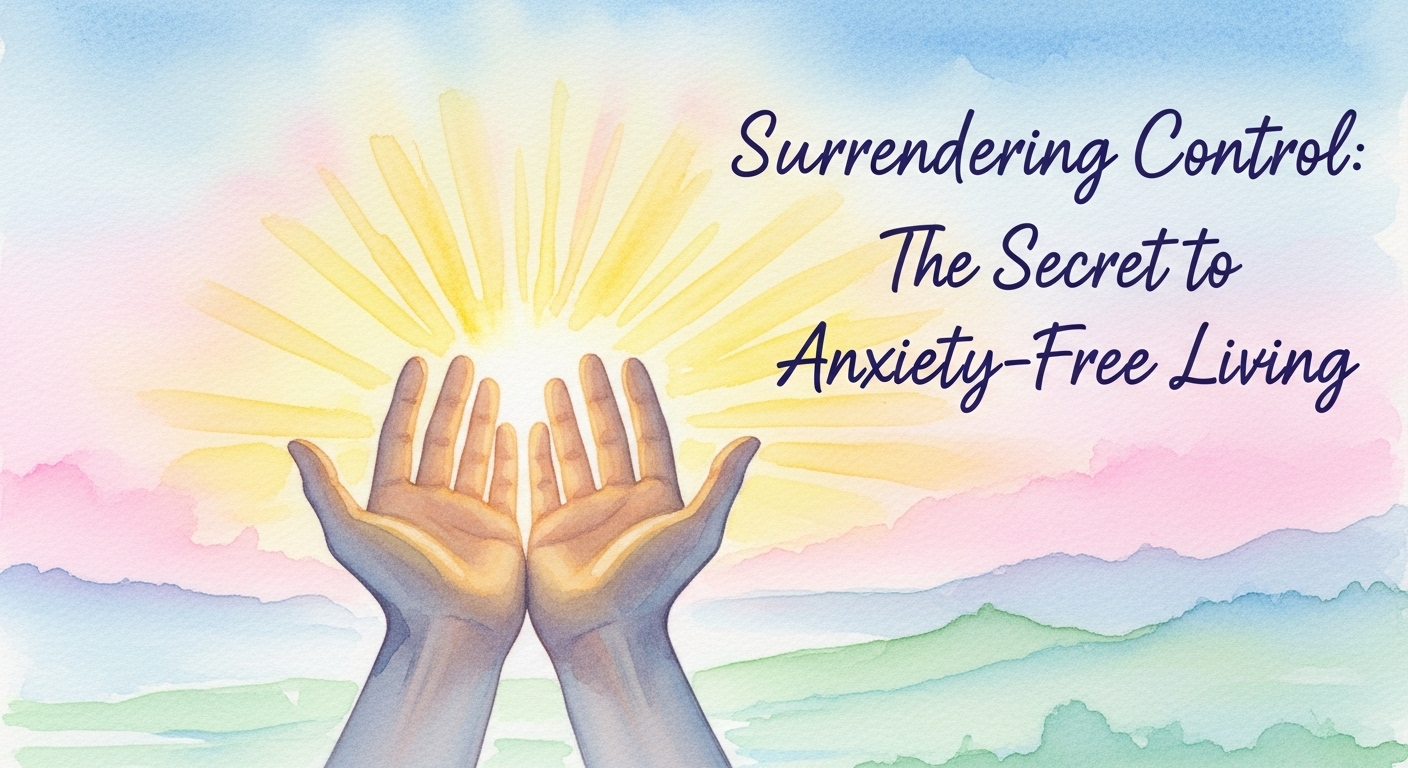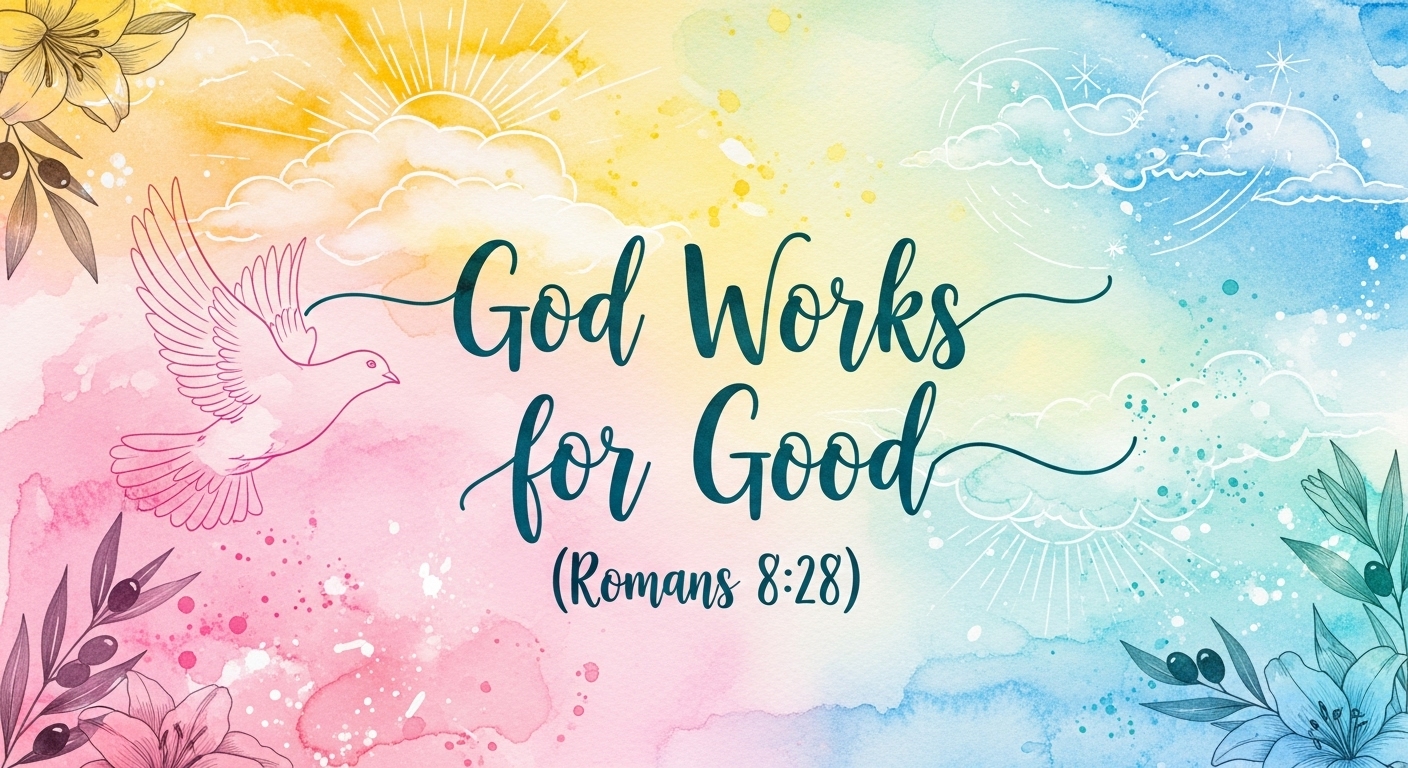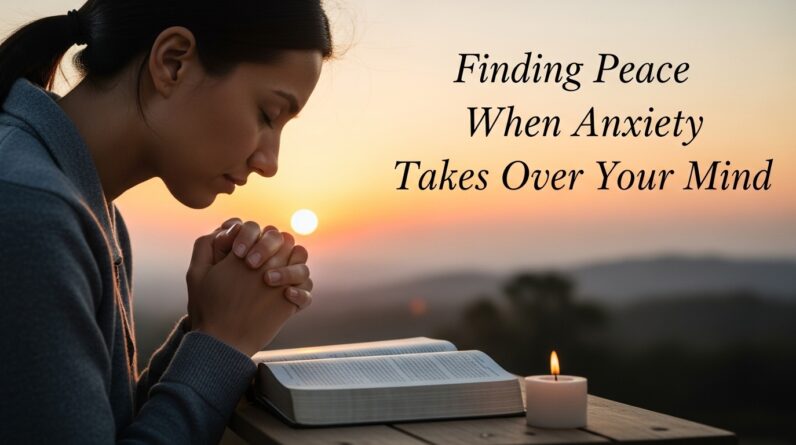Surrendering Control: The Secret To Anxiety-Free Living
You’re tired of the churn—your mind racing at night, your stomach knotting at the thought of another “what if,” and the constant urge to micromanage every outcome. You aren’t alone. What you may not have tried, or maybe you’ve tried and doubted, is a different way of living: surrendering control to God. That doesn’t mean you stop caring or stop acting; it means you stop carrying the weight of everything as if it all depends on you. In this article, you’ll explore what surrendering control to God looks like in practice, why it relieves anxiety, and how you can make it an everyday habit that reshapes your life.
Why You Cling to Control
You cling to control because control feels safe. When you can predict, plan, and manage outcomes, you feel protected from chaos, rejection, or failure. That compulsion to steer everything is an understandable human response to uncertainty, loss, and responsibility. But the more you try to control everything, the more your energy is used up on maintaining an illusion of safety.
The Hidden Costs of Control
Keeping everything under your thumb costs you emotional bandwidth, relationships, and even health. Anxiety is often the brain’s signal that you’re trying to hold too much on your own. When you’re constantly monitoring and adjusting to avoid worst-case scenarios, you miss out on the freedom and peace that come from trusting a power greater than yourself.
What “Surrendering Control to God” Really Means
Surrendering control to God isn’t about becoming passive, irresponsible, or spiritually complacent. It’s about shifting your posture from self-reliance to God-reliance—handing over the parts of life you can’t fix and continuing to act wisely in the areas where you’re called to work. In short, it’s cooperating with God rather than competing with His plan.
Surrender vs. Passivity
Surrender doesn’t excuse you from making decisions. Instead, it creates a healthier, faith-driven way of making them. You still plan, set boundaries, and take responsibility. But you do it with the awareness that control and outcomes are not ultimately yours, which releases the paralyzing fear that often accompanies decision-making.
The Biblical Heart of Letting Go
If you want a faith-based pathway out of anxiety, you’ll find it throughout Scripture. The Bible repeatedly invites you to trust God and relinquish anxious control, and it offers both promises and practices to help you do that. When you practice surrendering control to God, you’re aligning your life with teachings that have helped generations find peace.

Trust in the Lord With All Your Heart
The clearest invitation is found in Proverbs: “Trust in the Lord with all your heart and lean not on your own understanding; in all your ways submit to him, and he will make your paths straight.” This call to trust reminds you that God’s wisdom surpasses your limited viewpoint and that surrender begins with trusting His guidance rather than your limited understanding. Proverbs 3:5-6
Jesus’ Teaching on Worry
Jesus addressed anxiety head-on when He told people not to worry about basic needs—food, drink, clothing—because the Creator knows and cares for you. He encouraged you to seek God’s kingdom first and trust that the necessities will be provided. Practicing surrendering control to God often starts by shifting your daily focus to what matters eternally rather than what seems urgent now. Matthew 6:25-34
Present Your Requests to God
Paul’s words to the Philippians are practical: don’t be anxious; instead, present your requests to God with thanksgiving, and you’ll receive a peace that guards your heart and mind. Prayer is a central mechanism for surrender—bringing your worries into conversation with the One who can carry them for you. Philippians 4:6-7
Cast Your Anxiety on God
Peter’s simple command is almost tender: cast all your anxiety on Him because He cares for you. That image of “casting” implies a real transfer—an intentional act where you let go and let God hold what you cannot. Surrendering control to God is not vague; it’s an intentional, repeated practice. 1 Peter 5:7

How Surrendering Control to God Reduces Anxiety
When you stop carrying the weight of outcomes alone, your nervous system gets a chance to relax. Surrender loosens the urge to over-plan, over-prepare, and over-control. That doesn’t mean you’ll never feel fear or uncertainty; it means those feelings won’t dominate your life. Practically, surrendering control to God gives you mental space to think clearly, rest, and respond rationally.
Psychological and Spiritual Effects
Spiritually, surrender increases your trust in God’s presence and purposes. Psychologically, it reduces the cognitive load of trying to predict and prevent everything. The result is calmer thinking and clearer priorities, which then feed back into reduced anxious symptoms—like less rumination at night and fewer panic spikes during the day.
Practical Steps to Start Surrendering Today
You don’t need a dramatic conversion moment to begin surrendering control to God—you need small, consistent practices that reshape how you live. The following steps are practical ways to move from theoretical trust to lived surrender.
Begin with a Breath and a Prayer
When anxiety rises, stop for a breath and say a short prayer: “Lord, I give this to You.” That simple sentence makes surrender concrete and interrupts your spiraling mind. Over time, brief breath prayers become a reliable tool that you can use anywhere to recalibrate your posture toward trust.
Keep a “Surrender” Journal
Write down what you’re trying to control and then write a short prayer, handing each item to God. You’ll be surprised how tangible relief can be when you put fear on paper and symbolically place it in God’s hands. This habit turns abstract trust into a practice of real transfer.
Practice Gratitude as a Way of Trust
Gratitude reorients your focus from lack to provision. Each night, list three things you’re grateful for and offer thanks to God. Gratitude is a spiritual muscle that helps you remember God’s faithfulness, making surrendering control to God more natural when future uncertainties come.
Seek Wise Counsel, Not Isolation
Surrender isn’t isolation. Talk with a trusted friend, mentor, or pastor about what you’re trying to control. When you verbalize your fears to a wise person, you often discover perspective, prayer support, and practical next steps that make surrender actionable rather than passive.
Act with Faith
Surrender means you keep doing the next responsible thing—even when you trust God with the outcome. James reminds you that faith without works is dead; your part is to act in faith. Surrender doesn’t remove responsibility; it changes the motivation—from frantic control to faithful obedience. James 2:17
When Surrender Feels Impossible
There are times when surrendering feels frightening or impossible—because of past trauma, deep-seated fear, or a sense that God won’t come through. You’re not failing; you’re human. God often meets real struggle with steady truths and compassionate presence, and Scripture offers words to steady you.
God’s Presence in Fear
Isaiah reassures you not to fear because God is with you and will strengthen you. When surrender feels impossible, cling to the promise of God’s presence: He is near, not distant. That nearness becomes the hinge on which your surrender turns from fantasy to reality. Isaiah 41:10

God Works for Good
When you can’t see how things fit together, remember that God is at work for the good of those who love Him. This isn’t a magic formula that removes pain, but it is a trustworthy promise that God can weave even broken threads into something purposeful—giving you reason to release your insistence on controlling every stitch. Romans 8:28
Be Still and Know
Sometimes the most faithful response is to stop running. Psalm 46 counsels you to “be still and know.” Stillness is a disciplined form of surrender that lets you listen instead of always reacting—an essential practice for anyone learning to hand over anxious control. Psalm 46:10
Biblical Examples of Surrender (To Encourage You)
You aren’t inventing anything new; Scripture tracks countless examples of people who wrestled with control and learned to trust. Their stories aren’t just historical—they’re templates for your life.
Jesus in Gethsemane
Even Jesus faced urgent anxiety about suffering and choice. In the Garden of Gethsemane, He prayed, “Not my will, but yours,” modeling surrender in the most painful of circumstances. If Jesus’ surrender was honest and agonized, your surrender can be honest and real too. Matthew 26:39
Abraham’s Trust
Abraham’s life shows a steady pattern of trust when God’s plan looked impossible. His example encourages you to step forward in faith even when outcomes are uncertain—surrendering control to God while doing what next-step faith requires. Romans 4:3
The Promise of a Future
When plans derail and hope feels thin, Jeremiah’s reminder that God has plans for you still holds power: plans to prosper you and not to harm you, to give you hope and a future. That future-orientation helps you surrender the frantic need to force outcomes now. Jeremiah 29:11
How to Make Surrender a Daily Habit
Surrender becomes life-changing only when it’s practiced daily, in small ways. You can weave surrender into routines so it becomes as normal as brushing your teeth.
Morning Surrender Ritual
Start the day by briefly naming what you’ll try to control and explicitly handing it to God through prayer. This five-minute ritual sets the tone for a day of trust rather than fret.
Midday Check-In
Pause once in the middle of your day—on your lunch break or during a commute—and ask, “What am I trying to control right now?” Take that moment to pray and re-surrender with a simple breath prayer.
Evening Reflection
End your day by recounting where you saw God’s care and where you still felt anxious. Thank God for the moments He carried you, and write down any lessons learned. This nightly practice trains your mind to notice God’s faithfulness.
Tools and Spiritual Disciplines That Help
There are practical spiritual practices that make surrendering control to God more accessible: reading Scripture, worship, silence, confession, and community support. These aren’t quick fixes, but consistent use of them changes how you respond to life’s pressures.
Scripture as Anchor
Regular Scripture reading grounds you in God’s promises and helps you view your circumstances from a larger perspective. Verses of reassurance and command become touchstones in moments of anxiety.
Silence and Solitude
Solitude and silence create space to hear God’s voice instead of your racing thoughts. These disciplines retrain your nervous system to tolerate stillness and trust.
Worship and Gratitude
Worship reorders your heart by centering attention on God rather than problems. Gratitude, tied to worship, cultivates recognition of God’s present provision and reduces the frantic hunt for security.
Common Misconceptions About Surrender
You may resist surrender because you fear misconceptions: that surrender equals resignation, that it removes personal responsibility, or that it guarantees a trouble-free life. None of those is true. Surrender is an active trust that coexists with wisdom and action, and it frees you from anxiety without promising a problem-free path.
Surrender Is Not Weakness
Surrender is strength—choosing to trust in the middle of uncertainty takes courage. It’s not giving up; it’s letting go of an unhealthy burden so you can live more fruitfully.
Surrender Doesn’t Mean No Action
You still act; you just act differently. Surrender transforms anxious activity into faithful action—doing your part while trusting God with outcomes. This balance is the healthiest posture for sustainable living.
When You Slip Back into Control
You will slip into old habits. That’s normal, not disqualifying. What matters is what you do next—notice, name it, and re-surrender. Think of surrender as a training process: each time you choose to let go, your habit of trust strengthens.
A Simple Formula to Recover
When you recognize you’ve taken back control, do three things: stop, pray, and re-offer the concern to God. Count it as progress that you noticed. The noticing itself is growth.
How Surrender Shapes Relationships
When you stop needing to control outcomes, your relationships change for the better. You become less critical, more present, and more open to others’ agency. That shift often heals strained family ties, reduces conflict at work, and deepens friendships.
Trust in Others Grows
As you model trust in God, you also model trust in people. You stop micromanaging colleagues or family members and let responsibility be shared—freeing everyone involved.
The Long-Term Payoff: A Life Less Driven by Anxiety
As surrendering control to God becomes habitual, you’ll notice long-term changes: a steadier emotional life, increased clarity in decisions, deeper spiritual roots, and an ability to weather crises without being consumed by fear. You’ll still face hard days, but your default posture will be rest and trust instead of panic and grip.

Peace That Guards
When Paul wrote about the peace of God that guards hearts and minds, he described the very fruit of surrendered living. That peace isn’t just a feeling; it’s a protective reality that steadies your decisions and restores your sleep. Philippians 4:6-7
Quick Practices to Try Right Now
Here are a few short, practical exercises you can use whenever anxiety flares—real, doable ways to practice surrendering control to God.
- Take three deep breaths and say, “Lord, I give this to You.”
- Write one worry on a piece of paper and physically place it somewhere (or burn it safely) as a symbol of handing it over.
- Read a short promise verse and memorize it for quick recalling—like “Cast all your anxiety on him because he cares for you.” 1 Peter 5:7
- Replace speculation with one question: “What is the next faithful step?” Then do it.
When You Need More Help
If anxiety is overwhelming and persistent, seek support. Spiritual surrender works best alongside professional care when needed—counseling, therapy, or medical help. God’s care can work through both spiritual practices and professional help, and choosing both is a wise, surrendered move.
A Final Encouragement
Surrendering control to God is not a one-time event but a lifelong rhythm—small daily choices that gradually reshape your heart. Remember, God invites you to trust because He cares about you, not to punish or shame you for being anxious. You’re permitted to be honest, to struggle, and to lean on Him. When you practice handing over what you can’t hold, you open your life to a peace that the world cannot manufacture.
One Last Promise to Hold
When you feel tempted to clutch the wheel again, remember: “Cast your cares on the Lord and he will sustain you; he will never let the righteous be shaken.” Let that truth steady you as you practice surrendering control to God, step by faithful step. Psalm 55:22
If you want, start right now: take a breath, name one thing you’re trying to control, and say out loud, “I give this to You.” Repeat it tomorrow, and the next day, and watch how the muscles of surrender grow stronger.
Explore More
For further reading and encouragement, check out these posts:
👉 7 Bible Verses About Faith in Hard Times
👉 Job’s Faith: What We Can Learn From His Trials
👉 How To Trust God When Everything Falls Apart
👉 Why God Allows Suffering – A Biblical Perspective
👉 Faith Over Fear: How To Stand Strong In Uncertain Seasons
👉 How To Encourage Someone Struggling With Their Faith
👉 5 Prayers for Strength When You’re Feeling Weak

📘 Jesus and the Woman Caught in Adultery – Grace and Mercy Over Judgement
A powerful retelling of John 8:1-11. This book brings to life the depth of forgiveness, mercy, and God’s unwavering love.
👉 Check it now on Amazon 🛒💥
🔥 “Every great message deserves a home online.” 🌍💬🏡
Don’t let your calling stay hidden. Start a Christian blog or website using Hostinger — with 99.9% uptime, a free domain, and SSL, your voice can shine for God’s glory anytime, anywhere.
💥 Begin today. 🛒 Try it RISK-FREE! ✅
✝️ “Your body is God’s temple — care for it with purpose.” 💪💖🏛️
Renew your energy and restore balance naturally. Mitolyn helps support a healthy metabolism, giving you the vitality to live out God’s calling with strength and confidence.
🔥 Unlock Your Metabolic Power! ⚡Burn More Calories & Feel Great With Mitolyn. 💪
👉 Start Today. 🚀 Check Price Now. 🛒💰
💰 As a ClickBank & Amazon Affiliate, I earn from qualifying purchases.
📖 Acknowledgment: All Bible verses referenced in this article were accessed via Bible Gateway (or Bible Hub).
🚀 Want to explore more? 👉 Dive into our new post on Why Jesus? and experience the 🔥 life-changing truth of the Gospel!




